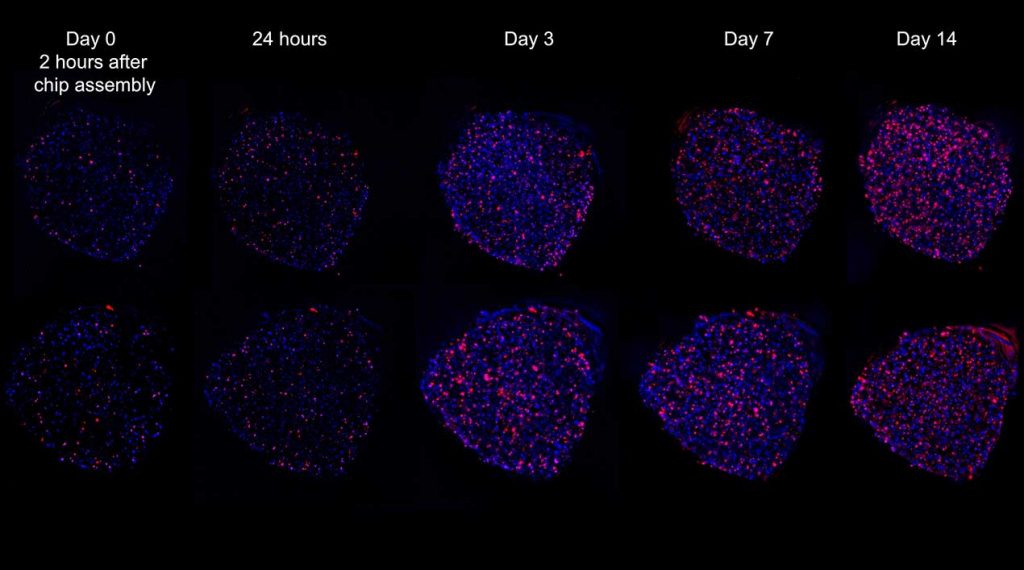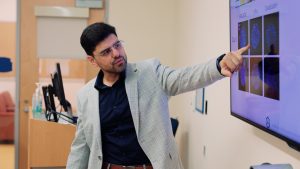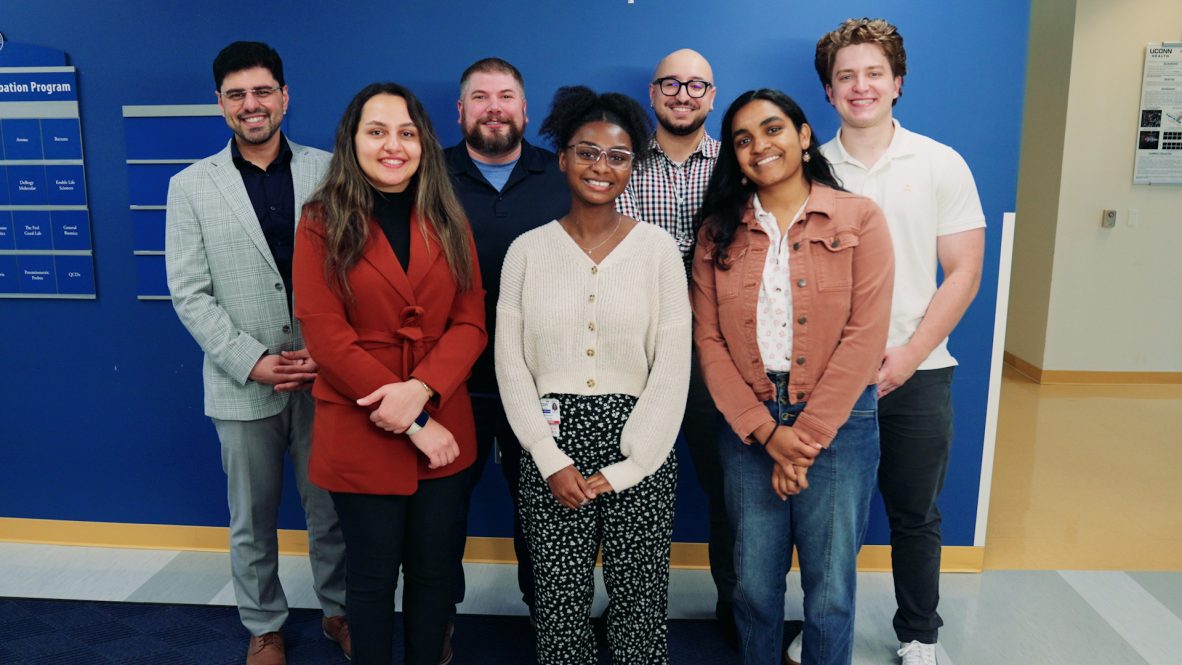When Armin Rad ‘19 Ph.D. and Leila Daneshmandi ‘20 Ph.D. set out to found Encapsulate in 2019, they couldn’t have foreseen where the next six years would take them.
Now, their biochip-based cancer care company is taking on the world.
Encapsulate’s proprietary technology allows for cancer tumors to be replicated on a biochip, outside the body. Initially, this technology was mainly used for testing various forms of chemotherapy – allowing clinicians to see how an individual patient’s cancer cells would respond to different treatments, rather than subjecting the patient themselves to endless trials.
But now, as the tech’s efficacy has been demonstrated through various clinical rounds, Encapsulate’s ambitions are expanding.
The company has completed two pilot clinical studies on chemotherapy for gastrointestinal cancers and is now planning to expand clinical studies for other forms of cancer.
“Too much of cancer therapy still follows a ‘treat-and-wait’ playbook; reacting to the disease and staying a step behind,” says Rad. “We’re shifting to a more rigorous, predictive, and comprehensive paradigm. Encapsulate’s approach is proactive: predict and lead. Our platform allows us to stay ahead, rather than chasing the disease.”
If successful, these goals would help advance Encapsulate’s mission to revolutionize cancer treatment, providing doctors and patients with precise and personalized tools.
From Starting Up to Seed Rounds
In November 2024, Encapsulate closed its seed round in an oversubscribed campaign, receiving a total of $1.8 million from various venture capital firms including Connecticut Innovations, Blackwood Healthcare Breakthroughs Capital, and Ambit Health Ventures.
The company then rang in the new year celebrating placing second at the Entrepreneurship World Cup Global Finals in Saudi Arabia, out of more than 16,000 applicants from 200 countries.
In 2025, Encapsulate also joined two prestigious international accelerator programs: CancerX and MedTech/BioTools Innovator.
These accelerators offer immense support in commercialization and company scaling, according to Rad. In Encapsulate’s case, this will include connections to healthcare systems, investors, and influential players in the healthcare ecosystem.
“We’re both first-time founders,” says Daneshmandi. “We’ve learned to surround ourselves with strong advisors and partners, and that collective expertise has been important in helping us grow Encapsulate.”
From the National Science Foundation (NSF), Encapsulate received a further $1.25M in a Small Business Innovation Research (SBIR) phase II award to advance their automated tumor-on-a-chip platform for personalized chemotherapy selection in pancreatic and colorectal cancers. This support will enable continued development, clinical validation, and scaling of Encapsulate’s technology.
For Rad and Daneshmandi – both of whom hold master’s degrees in global entrepreneurship from UConn, in addition to their Ph.D.s in biomedical engineering – the experience has been instrumental in pairing their scientific expertise with business acumen.
“We’ve reached an exciting phase,” says Daneshmandi. “Our technology has been clinically validated. We’re continuing to expand validation and are also now focused on scaling, building partnerships, and bringing this platform closer to patients.”
To Infinity and Beyond
Encapsulate is not only expanding their reach on the ground – they’re also shooting for the stars.
In March and November of 2024, the company launched its technology on the International Space Station. Samples from six patients orbited some 200 miles above Earth, carefully cultivated and monitored in a portable, autonomous device called CubeLab, about the size and shape of a lunchbox. (Encapsulate partnered with the company Space Tango to develop the device.)
By studying tumors in space, each biochip provides insights that clinicians simply wouldn’t have through traditional methods.
Cancer treatment in space may seem a bit unorthodox, but the microgravity conditions onboard the ISS allow researchers to better understand and predict cancer behavior. On Earth, cultivated tumors-on-a-chip grow in a flat, 2D plane; in microgravity, they form 3D configurations more similar to how they would behave in a human body. This allows researchers to track how tumor cells behave over time, which is crucial for complex assays, such as evaluation of metastasis, or of tumor resistance to different therapies.
Experiments with this tech have already shown intriguing results, according to reports from the ISS.
This year, the company received a $3.63M NASA InSPA Phase 1 grant and a $1M NASA SBIR Phase I/II award to develop its next generation of biochips, which is a Metastasis-on-a-Chip platform using microgravity environments aboard the International Space Station (ISS) National Laboratory.
“These experiments give oncologists a clearer view of how a patient’s cancer may progress or respond to treatment,” says Rad. “By studying tumors in space, each biochip provides insights that clinicians simply wouldn’t have through traditional methods.”

Back on Earth, Encapsulate is embarking on a multi-site pancreatic and colorectal cancer study at UConn Health, Memorial Sloan Kettering Cancer Center (MSK) in New York City, and Moffitt Cancer Center in Tampa, Fla. These sites are enrolling patients with pancreatic and colorectal cancers whose tumors will be profiled using Encapsulate’s system as they receive treatment. At the end of the study, real-world patient outcomes will be compared against Encapsulate’s prognoses, allowing the company to further hone the technology’s predictive capabilities.
The clinical studies at UConn Health were facilitated in large part by Joel Levine, MD, the founding director of UConn Health’s Colon Cancer Prevention Program. Levine officially joined the Encapsulate team last year as the Chief of Creativity. He saw a need for bringing the medical technologies developed by UConn startups – many of them with “outstanding potential” — into greater harmony with the UConn Health system, including connecting startup founders with the expertise of clinical faculty.
This connection allowed Encapsulate to develop an IRB protocol for a clinical study with human subjects at UConn Health who were undergoing chemotherapy for pancreatic cancer. UConn Health gastroenterologists John Birk, MD, and Murali Dharan, MD, were instrumental in developing this protocol, which was written “as part of more expansive research proposals that have been awarded over 4M dollars,” according to Levine.

Encapsulate “has developed a platform that serves a range of important needs,” Levine says. “First, it has proven, to date, as highly accurate in predicting clinical response to treatment. As important is its design and use pattern — access and cost are important considerations, and this chip system will be able to be ordered by clinical oncologists as a ‘routine’ test conducted in their own hospital labs. This will speed time for decisions and decrease costs to patients.”
The founders are eager to work with more healthcare systems across the United States as they continue to upscale their production.
“Over the next two to three years, while we continue studies on the ground, in space, and across multiple clinical sites, we aim to prepare our first product for clinical use,” Rad says.
Back to the Blue
While Encapsulate is now standing firmly on its own legs, Daneshmandi and Rad fondly remember the company’s infancy as a UConn-supported startup, and they prioritize giving back to the UConn community.
Daneshmandi is now an assistant professor-in-residence of Innovation and Entrepreneurship in UConn’s College of Engineering. She is also the Director of the Matthew and Margarethe Mashikian Innovation and Entrepreneurship Hub and the Co-Director of the Nursing and Engineering Innovation Center.
“I teach courses and develop programs based on what I’ve learned from my lived experience, and I think that resonates with students,” says Daneshmandi. “I share a lot of our personal experiences as well. I see my role mostly as empowering STEM students to step out of their shell and see entrepreneurship as a natural extension of their STEM training. I want them to develop an entrepreneurial mindset and realize they can take their ideas beyond the lab and translate them into real-world impact.”
Rad shares this philosophy. He is currently an adjunct faculty member at the UConn School of Medicine, where he develops courses focusing on clinical entrepreneurship. In addition, Encapsulate consistently employs 4-5 student interns from UConn, who gain valuable research and entrepreneurial experience.
“We owe a great deal to the mentors we had at UConn. They challenged us to stretch, to take risks, and to grow. As our relationship has evolved, it’s been a privilege to give back to the community that launched us.”



